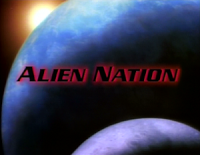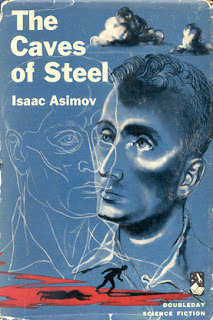Ted Rabinowitz's Blog, page 34
May 5, 2013
Mendelssohn's Fantastic Almanac - the Neckronomicon
This tome of madness holds secrets that Man Was Not Meant To Know. Unutterable secrets. Abominable secrets. Chiropractic secrets.
Published on May 05, 2013 14:06
May 3, 2013
Defiance - the Reviews Are in, and-
-sadly, unless things get better, this is another damp squib. It's also confirmation of the truism that special effects and money don't guarantee interesting science fiction.
(Oh, by the way - if you read farther, there's some slightly NSFW material. Say...PG-13.)
 The show looks good enough. The battered St. Louis Arch dominating the sky is an apt visual symbol for a post-apocalyptic Earth (not quite as good as a half-buried Statue of Liberty, but then, what is?); the sets have the ragged, refugee-chic look that a solid production budget can provide; there are plenty of alien species for that sprinkle of exoticism. Heck, they even invented new languages for the alien Votan races, and that worked for Game of Thrones and Star Trek. So why doesn't Defiance satisfy?
The show looks good enough. The battered St. Louis Arch dominating the sky is an apt visual symbol for a post-apocalyptic Earth (not quite as good as a half-buried Statue of Liberty, but then, what is?); the sets have the ragged, refugee-chic look that a solid production budget can provide; there are plenty of alien species for that sprinkle of exoticism. Heck, they even invented new languages for the alien Votan races, and that worked for Game of Thrones and Star Trek. So why doesn't Defiance satisfy?
Well, there are some performance/direction issues. For instance, when the ex-military drifter Nolan meets Mayor Amanda for the first time, his lines and delivery sound like the "I'm playing with you because I'm so much stronger than you" lines we've heard from action-movie villains since forever...but of course, it's the Mayor who has money, power, and Nolan's weapons, and he's just trying to get some of that back. In short, it sounds like he's threatening, when actually he should be begging. When deputy constable Tommy disperses a mob of angry Castithans, he does it with a line that should be delivered behind a targeted shotgun, but is instead tossed out with a shrug. Then there's the town whore who actually loves her work, and is apparently happy to throw in the Girlfriend Experience for Nolan at no extra charge. If Defiance were a person, I would say it isn't yet in touch with its own emotions.
But the real problem is elsewhere. Fact is, Defiance is a classic case of Rubber Forehead Alien syndrome. The Votan races - Castithan, Irathient, Indigene, whatever - all have motives so easily comprehensible that they might as well be humans. In fact, they're human tropes: The Irathient are the series' Noble Savages, the Castithans are its Fallen Aristocracy, the Liberata are its Comic Servants... There's no shock here, no surprise, and no feeling of "the Other." It makes an interesting contrast to another TV series with which O'Bannon was involved two decades ago: Alien Nation.

Alien Nation began as a movie with an inventive premise: What if the aliens do finally arrive on Earth - but instead of coming as conquerors or advanced beings, they are refugees, slaves, illegal immigrants? (This was years before the widely praised District Nine, which had pretty much the same premise, but took it in a much different direction.) The movie used the idea as the background for a fairly mundane cop-buddy-action story; but then it was made into a TV series, and things started to get interesting...because the writers for the show actually sat down and thought about "Visitor" society. They tried to make it work. The result was a society that was close enough to human to allow for some assimilation, but different enough to be weirdly different. Visitor society wasn't an exaggeration of some human character trait or historical culture (Klingon = Varangian Guard; Ferengi = Wagnerian Nibelung); it had the feeling of being its own unique thing. But that was the TV show. Its show runner was Kenneth Johnson (Six Million Dollar Man, V, The Hulk), not O'Bannon.
Of course, trying to accomplish the "Genuine Other" for SEVEN distinct alien races in a series would be a bit much. But it's the thing that would lift Defiance out of the weary rut of so many Syfy series. Too much to hope for, maybe.
(Oh, by the way - if you read farther, there's some slightly NSFW material. Say...PG-13.)
 The show looks good enough. The battered St. Louis Arch dominating the sky is an apt visual symbol for a post-apocalyptic Earth (not quite as good as a half-buried Statue of Liberty, but then, what is?); the sets have the ragged, refugee-chic look that a solid production budget can provide; there are plenty of alien species for that sprinkle of exoticism. Heck, they even invented new languages for the alien Votan races, and that worked for Game of Thrones and Star Trek. So why doesn't Defiance satisfy?
The show looks good enough. The battered St. Louis Arch dominating the sky is an apt visual symbol for a post-apocalyptic Earth (not quite as good as a half-buried Statue of Liberty, but then, what is?); the sets have the ragged, refugee-chic look that a solid production budget can provide; there are plenty of alien species for that sprinkle of exoticism. Heck, they even invented new languages for the alien Votan races, and that worked for Game of Thrones and Star Trek. So why doesn't Defiance satisfy?Well, there are some performance/direction issues. For instance, when the ex-military drifter Nolan meets Mayor Amanda for the first time, his lines and delivery sound like the "I'm playing with you because I'm so much stronger than you" lines we've heard from action-movie villains since forever...but of course, it's the Mayor who has money, power, and Nolan's weapons, and he's just trying to get some of that back. In short, it sounds like he's threatening, when actually he should be begging. When deputy constable Tommy disperses a mob of angry Castithans, he does it with a line that should be delivered behind a targeted shotgun, but is instead tossed out with a shrug. Then there's the town whore who actually loves her work, and is apparently happy to throw in the Girlfriend Experience for Nolan at no extra charge. If Defiance were a person, I would say it isn't yet in touch with its own emotions.
But the real problem is elsewhere. Fact is, Defiance is a classic case of Rubber Forehead Alien syndrome. The Votan races - Castithan, Irathient, Indigene, whatever - all have motives so easily comprehensible that they might as well be humans. In fact, they're human tropes: The Irathient are the series' Noble Savages, the Castithans are its Fallen Aristocracy, the Liberata are its Comic Servants... There's no shock here, no surprise, and no feeling of "the Other." It makes an interesting contrast to another TV series with which O'Bannon was involved two decades ago: Alien Nation.

Alien Nation began as a movie with an inventive premise: What if the aliens do finally arrive on Earth - but instead of coming as conquerors or advanced beings, they are refugees, slaves, illegal immigrants? (This was years before the widely praised District Nine, which had pretty much the same premise, but took it in a much different direction.) The movie used the idea as the background for a fairly mundane cop-buddy-action story; but then it was made into a TV series, and things started to get interesting...because the writers for the show actually sat down and thought about "Visitor" society. They tried to make it work. The result was a society that was close enough to human to allow for some assimilation, but different enough to be weirdly different. Visitor society wasn't an exaggeration of some human character trait or historical culture (Klingon = Varangian Guard; Ferengi = Wagnerian Nibelung); it had the feeling of being its own unique thing. But that was the TV show. Its show runner was Kenneth Johnson (Six Million Dollar Man, V, The Hulk), not O'Bannon.
Of course, trying to accomplish the "Genuine Other" for SEVEN distinct alien races in a series would be a bit much. But it's the thing that would lift Defiance out of the weary rut of so many Syfy series. Too much to hope for, maybe.
Published on May 03, 2013 17:35
April 29, 2013
Mendelssohn's Fantastic Almanac - Hand of Maury
A terrible item of black magic - a candelabra made from the severed hand of an executed talk-show host. It induces chair-throwing rage or tears of remorse from all who behold it.
Published on April 29, 2013 16:13
April 22, 2013
I've got some thoughts about "Defiance," Rockne S. O'Bannon-
-and Syfy, but I'll save them until next week. I don't want to pass judgment on the pilot alone. But if all goes as expected, I'll be doing some cultural mining of a long-forgotten movie and TV series. Stay tuned.
Published on April 22, 2013 09:01
April 21, 2013
Mendelssohn's Fantastic Almanac - Bag of Molding
Perfect for most city apartments, but only usable by Level 12 Interior Decorators.
Published on April 21, 2013 21:27
April 16, 2013
I can see your house from here!
 If you're a semiotics nerd, you're familiar with the notion that there are at least three versions of any text: the one the author thinks he's written, the actual aggregation of words, and the story the reader perceives in his head.
If you're a semiotics nerd, you're familiar with the notion that there are at least three versions of any text: the one the author thinks he's written, the actual aggregation of words, and the story the reader perceives in his head.There's actually a little less to this idea than meets the eye, but it functions pretty forcefully in speculative fiction. In SF we spend a lot of time describing (and implying, and inferring, and hinting at) worlds and situations that no human reader could ever have encountered in reality. When Ian Fleming described an auction in The Property of a Lady, he knew that there was a certain consensus reality on what an auction would look like, sound like, smell like. That
But when Arthur C. Clarke describes the surface of Venus in Before Eden, or Larry Niven lays out the geography of the Ringworld, they are describing environments (and in some cases, animals and sapients) that no one has ever seen; that simply don't exist. The gaps, the things not described, the things that can't be assumed, are much, much bigger than they are in any other kind of fiction.
With that much room, the mind of the reader works overtime - but so does the mind of the writer. If a writer writes what he knows, then he will draw on what he knows to fill in the blanks of his imagined worlds. In the process, he will reveal a lot more of himself than he might realize.
The classic example is Isaac Asimov. His novel The Caves of Steel is a detective story set in a future in which overpopulation has driven humanity into enormously crowded underground cities. Living space is more precious than gold, eating takes place in communal cafeterias, and virtually no one uses, let alone owns, a personal vehicle; mass transit is a necessity for everyone.
 The Caves of Steel was a success when it was published. Asimov was gratified but also surprised, because there was one aspect of the reception he had never expected: Readers and reviewers assumed that his future was a dystopia, a warning of things to come. But to Asimov, it was a future that actually seemed somewhat cosy - because to describe that world, to create the believable atmosphere of the City's people movers and public spaces and crowds, Asimov had drawn on his own experience as a New York boy who loved his hometown, and as a claustrophile, someone who feels comfortable in tight spaces. Later on, in his Foundation series, the galactic capital of Trantor is a world entirely covered by a single city, with only one open park space - the Imperial compound. There's an introductory scene in which a minor character ascends an observation tower to take in a view of the city, overwhelmingly reminiscent of the trip to the top of New York's Empire State Building, and the view out onto the cityscape of Manhattan...with the green rectangle of Central Park squarely in the middle.
The Caves of Steel was a success when it was published. Asimov was gratified but also surprised, because there was one aspect of the reception he had never expected: Readers and reviewers assumed that his future was a dystopia, a warning of things to come. But to Asimov, it was a future that actually seemed somewhat cosy - because to describe that world, to create the believable atmosphere of the City's people movers and public spaces and crowds, Asimov had drawn on his own experience as a New York boy who loved his hometown, and as a claustrophile, someone who feels comfortable in tight spaces. Later on, in his Foundation series, the galactic capital of Trantor is a world entirely covered by a single city, with only one open park space - the Imperial compound. There's an introductory scene in which a minor character ascends an observation tower to take in a view of the city, overwhelmingly reminiscent of the trip to the top of New York's Empire State Building, and the view out onto the cityscape of Manhattan...with the green rectangle of Central Park squarely in the middle.Experience transformed is one of the great tricks in the SF writer's Magician's Handbook. It's a shortcut for those moments when you haven't the ability (or, frankly, the interest) to work out an event or experience rigorously from first principles. That's why the Enterprise in the original Star Trek functioned roughly as a naval vessel, and why the mechanics of a light saber is closer to a katana than a plasma torch.
It's also why so much of Robert Heinlein's early work is so impressive. As an engineer, Heinlein was often not using personal experience. Instead, he was working out the mechanics of his settings from first principles. The way gravity functioned on the starship in Orphans of the Sky; the breeder reactor and its effects in Blowups Happen (written five years before the explosion of the first atomic bomb); the terrible acrophobia of Ordeal in Space. Larry Niven did something of the same with his aliens - the caste-ridden Moties, the ethical-coward Puppeteers, the Pak - and the extreme extraterrestrial environments of places like the Ringworld, Plateau, and Jinx.
But when a writer uses personal experience, he inevitably gives something of himself away. Although Heinlein worked from first principles with the scientific aspects of his stories, when it came to the social, you could see the Missouri and California desert peeping through, with Freemasons, Chambers of Commerce, and pumpkin doin's. Some of Niven's short stories - like Cloak of Anarchy - feel like the future from LA, 1970.
It's a tool that works - it helps ground the story and the reader in that consensus reality. And sometimes, it's a little "tell" about the writer.
Published on April 16, 2013 11:42
April 14, 2013
Mendelssohn's Fantastic Almanac - The Bark Lord
Controls all evil doggies, everywhere.
Beware the Chihuahuas of Doom.
Beware the Chihuahuas of Doom.
Published on April 14, 2013 21:25
I Love This, and I'm a Hominid!
Published on April 14, 2013 07:36
April 7, 2013
Mendelssohn's Fantastic Almanac - The Plus None
The Plus None: A magical object that is more trouble than it is worth.
"Didja hear about that new Ring of Immortality Savarnion tried on? It works, but you have to listen to the Allman Brothers Band every day you wear it."
"Ooh, total Plus None, baby."
"Didja hear about that new Ring of Immortality Savarnion tried on? It works, but you have to listen to the Allman Brothers Band every day you wear it."
"Ooh, total Plus None, baby."
Published on April 07, 2013 21:23
Mendelssohn's Almanac - The Plus None
The Plus None: A magical object that is more trouble than it is worth.
"Didja hear about that new Ring of Immortality Savarnion tried on? It works, but you have to listen to the Allman Brothers Band every day you wear it."
"Ooh, total Plus None, baby."
"Didja hear about that new Ring of Immortality Savarnion tried on? It works, but you have to listen to the Allman Brothers Band every day you wear it."
"Ooh, total Plus None, baby."
Published on April 07, 2013 21:23



